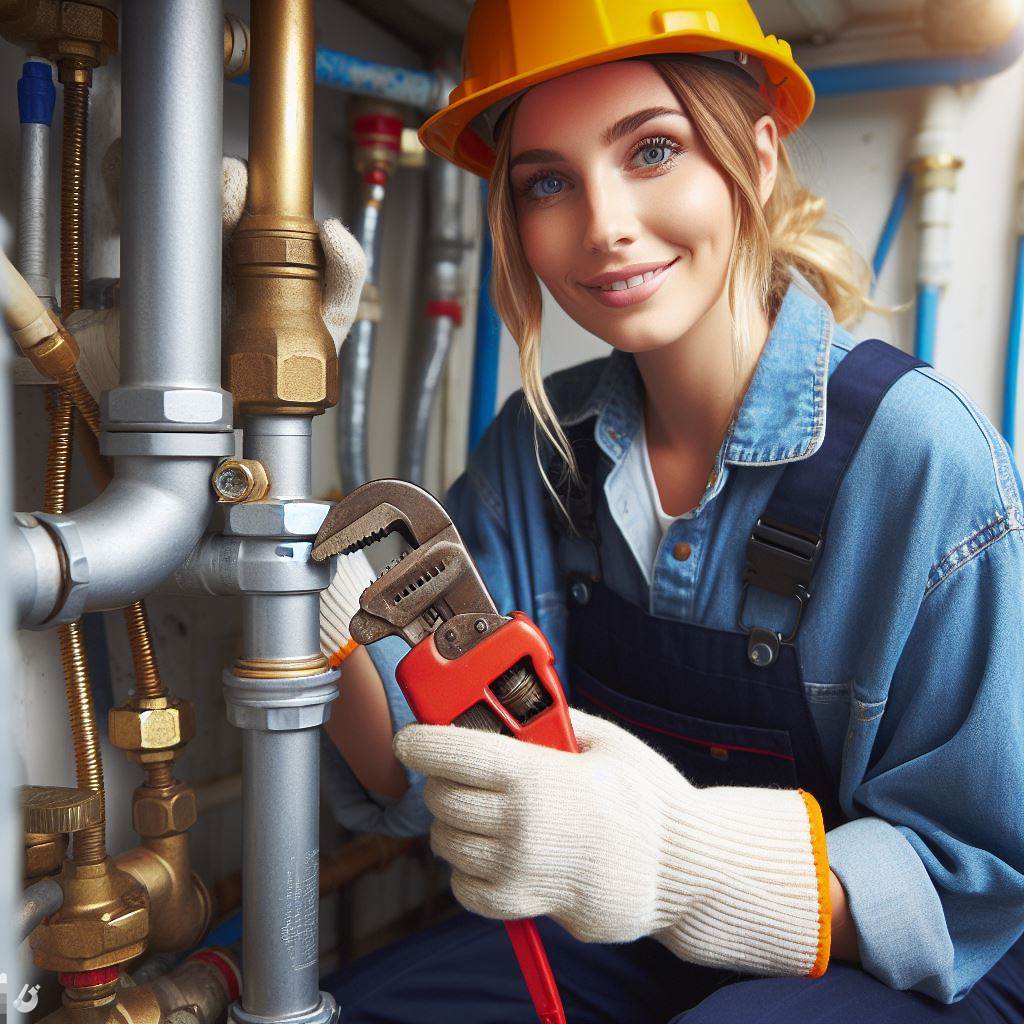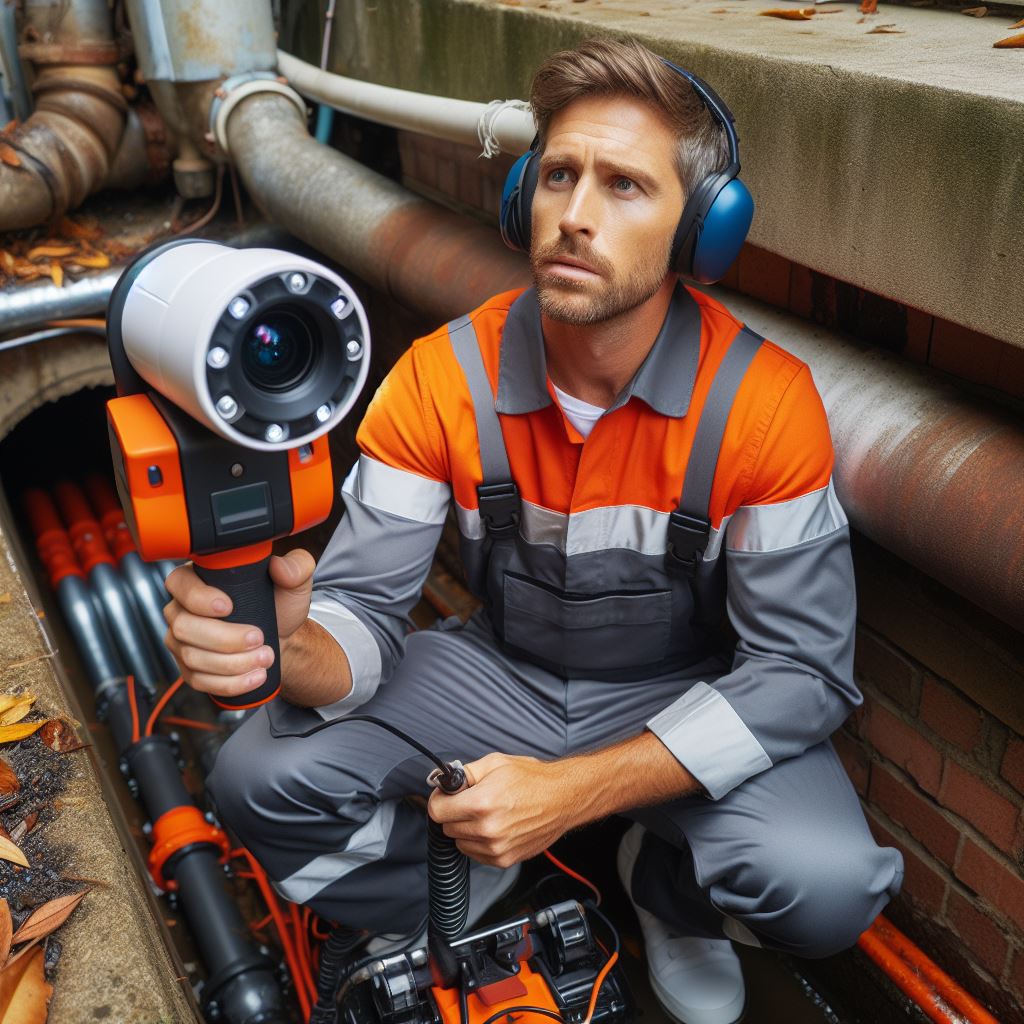Introduction
Australia’s plumbing industry plays a crucial role in ensuring the functionality and safety of our homes, businesses, and infrastructure.
Plumbers are highly skilled professionals who are responsible for installing, maintaining, and repairing plumbing systems.
Brief overview of the plumbing industry in Australia
The plumbing industry in Australia is a thriving and essential sector. It encompasses a wide range of services, including water supply, drainage, gas fitting, and roofing.
With a high demand for plumbing services, the industry employs thousands of workers across the country.
Importance of plumbers in society
Plumbers hold a significant position in society as they provide essential services that are vital for everyday life.
They ensure the proper functioning of water systems, which is critical for hygiene and the overall health of individuals and communities.
Moreover, plumbers play a crucial role in conserving water and preventing wastage.
They are responsible for detecting leaks, repairing faulty pipes, and promoting water-saving practices.
This contributes to sustainable water management and helps protect our precious natural resources.
Plumbers also play an important role in ensuring the safety of buildings by installing and maintaining gas fitting systems.
They are trained to handle hazardous materials in a manner that reduces the risk of accidents and protects both the environment and public health.
In addition to their technical skills, plumbers possess excellent problem-solving abilities and often work in challenging and unpredictable situations.
They are required to navigate complex plumbing systems and find innovative solutions to address issues efficiently.
Overall, plumbers are indispensable professionals who provide essential services, contribute to public health and safety, and play a significant role in ensuring the functionality of our society as a whole.
Their expertise and dedication are vital in addressing the challenges facing the plumbing industry in Australia today.
The plumbing industry in Australia is currently grappling with a number of challenges that are impacting its capacity and service quality. These challenges include:
Shortage of Skilled Plumbers
- A shortage of skilled plumbers is a major issue plaguing the industry.
- There is a lack of young individuals entering the plumbing trade, exacerbating the problem.
- This shortage hampers the industry’s ability to meet growing demand for plumbing services.
Aging Workforce and Retirements
- The plumbing workforce in Australia is predominantly aging.
- With many plumbers nearing retirement age, there is a concern about a significant loss of skilled workers.
- Replacing experienced plumbers with new recruits takes time and can lead to a temporary decline in service quality.
Impact on Industry Capacity and Service Quality
- The shortage of skilled plumbers and the aging workforce directly impact the capacity of the industry.
- This means longer wait times for plumbing services and potential delays in emergency situations.
- Quality of service may also be compromised due to the lack of experienced plumbers available to handle complex projects.
The above challenges have a domino effect on various aspects of the plumbing industry.
Firstly, the shortage of skilled plumbers results in increased competition for those available, driving up labor costs.
Secondly, the lack of young people entering the trade means there are fewer apprenticeships being undertaken, further exacerbating the skill shortage.
This leads to a cycle of fewer trainers available to teach the trade, as many turn to retirement.
Thirdly, the aging workforce and retirements mean there is a loss of valuable experience in the industry.
This experience is not easily replaced, affecting the quality and efficiency of plumbing services.
Lastly, the impact on industry capacity and service quality can have negative consequences for both businesses and customers.
Businesses may struggle to meet demands, leading to dissatisfied customers and potential loss of business.
In order to address these challenges, it is essential for the plumbing industry to take proactive steps:
Encouraging and promoting plumbing as a viable career option for young people through apprenticeship programs and educational initiatives.
Offering attractive incentives and competitive salaries to attract and retain skilled plumbers.
Investing in ongoing training and development programs for existing plumbers to keep their skills up-to-date.
Collaborating with educational institutions to ensure the availability of quality training programs for aspiring plumbers.
Advocating for government support and funding to address the shortage of skilled plumbers.
By acknowledging and actively addressing these challenges, the plumbing industry in Australia can ensure a sustainable future with a skilled and capable workforce.
Read: Plumbing 101: A Beginner’s Guide in Australia
Technological Advancements
In the rapidly evolving landscape of plumbing, technological advancements play a pivotal role.
The adoption of new plumbing technologies has become a hallmark of the industry, enhancing efficiency and introducing innovative solutions.
However, with this rapid progress comes a set of challenges for plumbers as they strive to keep pace with the ever-changing landscape.
Adoption of new plumbing technologies
The adoption of new plumbing technologies introduces challenges in staying abreast of the latest trends and innovations.
Plumbers are confronted with the need to continuously update their skill sets to remain competent in handling cutting-edge tools and systems.
The challenge lies not only in understanding the intricacies of these advancements but also in implementing them effectively to provide optimal solutions to clients.
Challenges in keeping up with advancements
Keeping up with technological advancements in plumbing necessitates a commitment to ongoing training and upskilling.
Plumbers are required to invest time and resources in educational programs that provide insights into emerging technologies and their practical applications.
This commitment to professional development is essential for ensuring that plumbers can confidently navigate the complexities of modern plumbing systems.
Training and upskilling requirements for plumbers
The training and upskilling requirements for plumbers extend beyond traditional methods, embracing a dynamic approach that integrates both theoretical knowledge and hands-on experience.
Educational initiatives and apprenticeship programs play a crucial role in equipping plumbers with the expertise needed to leverage new technologies effectively.
Continuous learning becomes a cornerstone in the career path of plumbers, enabling them to adapt to changes and deliver high-quality services in an evolving technological landscape.
In essence, the integration of new plumbing technologies presents both opportunities and challenges for professionals in the field.
Train and upskill plumbers proactively to harness tech benefits and overcome rapid challenges in their evolution.
Read: A Day in the Life of an Aussie Plumber
Regulatory Changes and Licenses
The plumbing industry in Australia is subject to constant regulatory changes and license requirements.
These factors pose significant challenges for Aussie plumbers, affecting their day-to-day operations and overall business prospects.
In this section, we will discuss some of the key challenges faced by plumbers in the country.
Your Personalized Career Strategy
Unlock your potential with tailored career consulting. Get clear, actionable steps designed for your success. Start now!
Get StartedIntroduction of new regulations and standards pose challenges for Aussie plumbers
Introduction of new regulations and standards can disrupt the plumbing industry.
Plumbers must adapt to these changes by understanding and implementing new practices, materials, and technologies.
Stay updated
This requires staying up-to-date with the latest regulations and investing resources in training and education.
Failure to comply with the new rules can lead to penalties, loss of customers, and reputational damage.
Licensing requirements and ongoing education demand
Licensing requirements play a crucial role in the plumbing profession.
Plumbers need to obtain and maintain appropriate licenses to legally operate their businesses.
These licenses ensure that plumbers have the necessary skills and qualifications to perform their jobs safely and effectively.
However, the process of obtaining licenses can be time-consuming and costly, sometimes causing delays and financial strain for plumbers.
Ongoing education is another challenge faced by plumbers in Australia.
To maintain their licenses, plumbers must complete a certain number of Continuing Professional Development (CPD) hours.
These hours are aimed at enhancing their skills, knowledge, and industry awareness.
Plumbers need to allocate time and resources to attend workshops, courses, and seminars to fulfill their CPD requirements.
Invest time and resources
Compliance with regulations and standards poses significant challenges for plumbers.
The plumbing industry is heavily regulated to ensure safety, quality, and environmental sustainability.
Compliance requires extensive documentation, record-keeping, and adherence to specific guidelines.
Plumbers need to allocate additional time and resources to meet these compliance obligations, impacting their overall productivity and efficiency.
Compliance challenges
Moreover, the complexity and frequent changes in regulations can make compliance even more challenging.
Plumbers must constantly monitor and adapt to any updates or revisions in the regulations.
This demands a proactive approach and a willingness to invest in training and knowledge enhancement.
Failure to comply with the regulations can result in legal consequences, financial penalties, and damage to the plumber’s reputation.
In summary, Aussie plumbers face significant challenges due to regulatory changes and licensing requirements.
The ongoing introduction of new regulations, licensing obligations, and compliance challenges demand constant adaptation and professional development.
Plumbers need to invest time, effort, and resources to stay updated, maintain their licenses, and ensure compliance with the evolving industry standards.
By overcoming these challenges, plumbers can continue to provide high-quality plumbing services and contribute to the growth and success of the industry.
Read: The Future of Plumbing Tech in Australia

Health and Safety Concerns
Plumbers in Australia face numerous health and safety concerns, which are crucial to address for a safe and secure work environment.
These concerns include exposure to hazardous materials and chemicals, physical strain, and the risk of injuries. To ensure a preventative approach, it is vital to maintain safety standards in the plumbing profession.
Exposure to Hazardous Materials and Chemicals
One of the major health concerns for Aussie plumbers is exposure to hazardous materials and chemicals.
Plumbers often come into contact with toxic substances, such as asbestos, lead, and mold, while working on pipes or drainage systems.
These materials can pose serious health risks, including respiratory issues, skin irritation, and long-term illnesses.
Plumbers must take the necessary precautions, such as wearing protective gear and following safe handling and disposal practices, to mitigate these risks.
Regular training and awareness programs can also help plumbers stay updated on the dangers associated with different materials and chemicals they encounter on the job.
Physical Strain and Risk of Injuries
Plumbing work involves numerous physical tasks such as lifting heavy objects, bending, and working in confined spaces.
This can lead to physical strain and an increased risk of injuries for plumbers.
The repetitive nature of some tasks, like twisting pipes or fittings, can cause muscle strains and joint problems over time.
Plumbers may also be at risk of slips, falls, and cuts due to working with sharp tools in challenging environments.
It is crucial for plumbers to practice proper lifting techniques, use ergonomic tools and equipment, and maintain good posture to reduce the risk of injuries.
Additionally, regular exercise and stretching can help improve strength and flexibility, further preventing physical strain.
Importance of Maintaining Safety Standards in the Profession
Maintaining safety standards is essential in the plumbing profession to protect the well-being of plumbers and ensure high-quality service for clients.
Adhering to safety protocols helps prevent accidents and injuries, reduces liability for plumbing companies, and instills confidence in customers.
Plumbers must undergo comprehensive training on safety procedures, such as lockout/tagout, the use of personal protective equipment, and the proper handling of hazardous substances.
Regular safety audits and inspections can also identify potential hazards and ensure that safety standards are being followed.
By prioritizing safety, plumbers can establish a reputation for professionalism and reliability in their field.
In short, health and safety concerns are significant challenges faced by Aussie plumbers in their day-to-day work.
Exposure to hazardous materials and chemicals, physical strain, and the risk of injuries are some of the key issues to address.
By prioritizing safety, taking necessary precautions, and maintaining high standards, plumbers can mitigate these challenges and create a safer and more secure working environment.
Ultimately, a safe work environment not only protects the well-being of plumbers but also contributes to the overall success and reputation of the plumbing profession in Australia.
Read: Top Plumbing Trends in Australian Engineering
Find Out More: Soil Types and Landscaping in Australia
Business and Economic Environment
A comprehensive analysis of the contemporary business and economic environment is paramount for plumbers seeking to navigate the ever-evolving dynamics of their industry successfully.
Understanding the intricate interplay between various economic factors and business conditions is essential for making informed decisions and staying resilient in the face of challenges.
Increasing competition in the plumbing industry
One significant challenge that stands out is the escalating competition within the plumbing sector.
With an increasing number of players vying for market share, plumbers are compelled to adopt heightened strategic approaches to distinguish themselves.
This calls for a proactive stance in adapting to market trends, technological advancements, and customer preferences.
Stand Out with a Resume That Gets Results
Your career is worth more than a generic template. Let us craft a resume and cover letter that showcase your unique strengths and help you secure that dream job.
Get HiredEconomic impacts on business sustainability
Delving deeper into the landscape, the economic impacts on business sustainability emerge as a critical consideration.
Economic fluctuations, market uncertainties, and external factors can significantly influence the stability and longevity of plumbing businesses.
Therefore, plumbers must not only be reactive but also proactive, anticipating potential economic shifts and implementing measures to ensure sustainability.
Need for effective marketing and business management skills
Amidst these challenges, the need for effective marketing and business management skills becomes even more pronounced.
A strategic and well-executed marketing plan is essential for standing out in a crowded marketplace.
Additionally, strong business management skills are crucial for maintaining operational efficiency, financial stability, and fostering growth.
In general, the confluence of these factors underscores the intricate nature of the plumbing industry.
Plumbers thrive by adopting a holistic approach—understanding business, strategic planning, and investing in marketing and management.
This multifaceted approach not only positions plumbers to navigate challenges effectively but also empowers them to harness emerging opportunities in the ever-competitive plumbing sector.
Environmental Sustainability
In the ever-evolving landscape of plumbing, Australian professionals find themselves at a critical crossroads.
The demand for environmentally-friendly plumbing solutions is soaring, but so are the challenges associated with adapting to sustainable practices.
Australian plumbers are at the forefront of a transformative era, with a growing emphasis on environmental sustainability. The pressure to align with eco-friendly practices is more prominent than ever.
Meeting the Surge in Demand
The surge in demand for environmentally-friendly plumbing solutions is reshaping the industry.
Clients are increasingly seeking green alternatives, pushing plumbers to diversify their skill set and embrace sustainable technologies.
Navigating the Challenges
However, this transition is not a seamless one. Plumbers face a host of challenges as they strive to incorporate sustainable practices into their day-to-day operations. These challenges include:
- Integrating Eco-Friendly Materials: Plumbers need to source and integrate materials that are both efficient and environmentally responsible.
- Implementing Energy-Efficient Technologies: Adopting technologies that reduce energy consumption poses a significant challenge, requiring plumbers to stay updated on the latest advancements.
- Adapting Traditional Practices: Adjusting longstanding practices to align with sustainable methods may require additional training and a willingness to embrace change.
- Overcoming Cost Barriers: Initial investments in eco-friendly technologies may pose financial challenges, and plumbers must navigate cost considerations while delivering sustainable solutions.
The Crucial Role of Eco-Friendly Initiatives
Despite the challenges, plumbers are recognizing the pivotal role of industry-wide eco-friendly initiatives.
These initiatives serve as a beacon, guiding professionals through the complexities of sustainable practices and offering a collaborative platform for shared knowledge and experience.
- Training and Education: Comprehensive training programs can equip plumbers with the skills and knowledge needed to seamlessly integrate sustainable practices into their work.
- Collaboration and Knowledge Sharing: Plumbers actively collaborate, sharing sustainable insights and experiences, collectively fostering environmental responsibility in the industry.
- Advocacy for Policy Changes: Plumbers play a crucial role in advocating for policies that support environmentally-friendly practices, contributing to a regulatory environment that encourages sustainability.
Basically, Australian plumbers are navigating the challenges presented by the growing demand for environmentally-friendly plumbing solutions.
To achieve environmental sustainability, take a proactive stance, overcome obstacles, embrace industry initiatives, and acknowledge plumbers’ pivotal role.
Conclusion
In closing, Aussie plumbers face numerous challenges in today’s industry. These challenges include a shortage of skilled workers, increasing competition, and the need to adapt to new technologies.
It is crucial to address these challenges to ensure the efficient delivery of plumbing services and the satisfaction of customers.
Recap of the challenges facing Aussie plumbers today
To recap, Aussie plumbers are struggling with a shortage of skilled workers, which can lead to delays and unsatisfactory service.
Additionally, the industry is becoming increasingly competitive, making it difficult for individual plumbers to find work.
Finally, plumbers must adapt to new technologies and advancements in order to stay relevant and competitive in the market.
Importance of addressing these challenges
Addressing these challenges is crucial for the plumbing industry. By ensuring a sufficient number of skilled workers are available, customers can receive prompt and efficient service.
Additionally, addressing competition within the industry will help plumbers secure work and support their livelihoods.
Finally, adapting to new technologies will improve efficiency, productivity, and customer satisfaction.
Call to action for the industry to support and overcome these challenges
It is essential for the industry as a whole to support and overcome these challenges. This can be done by investing in training programs and initiatives to address the shortage of skilled workers.
Plumbers can also collaborate and share knowledge to tackle competition collectively. Additionally, embracing new technologies and staying updated on advancements will help maintain a competitive edge.
By working together, the industry can support plumbers to overcome these challenges and ensure a thriving and successful future.




